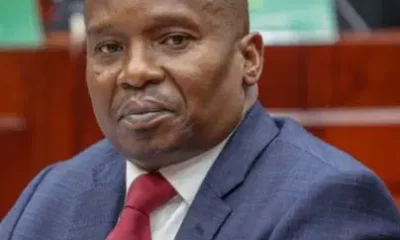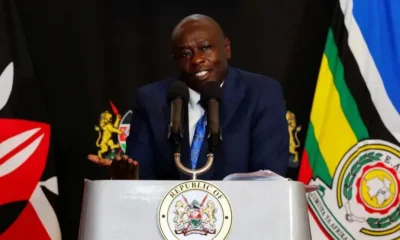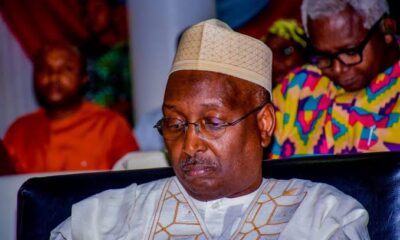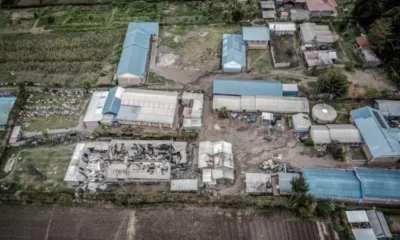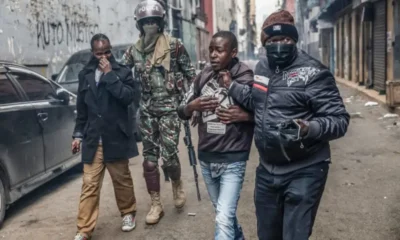Opinion
Salihu Moh. Lukman: Importance of legislature to a democracy
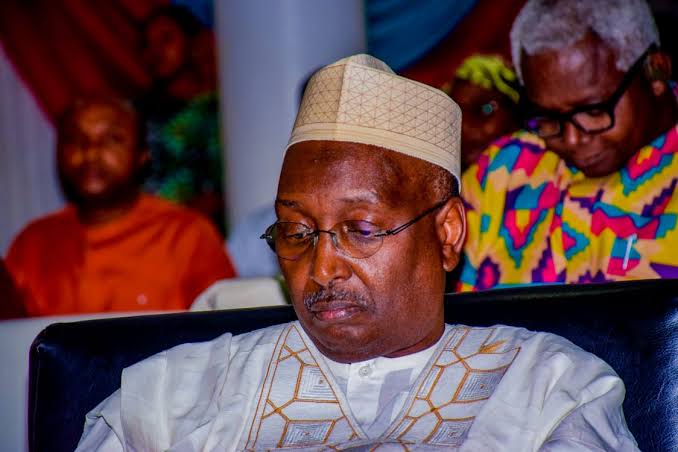
In the last one-week, since the protest of Tuesday, June 25, 2024 by young people against the Kenyan Finance Bill submitted to Kenyan parliament by President William Ruto, Nigerian social media platforms have been abuzz with posts and video clips of issues around the Kenyan protests.
One of them is a clip of Sen. Crystal Asige, who within about 10 minutes eloquently and succinctly captures both the essence and connection of democracy as the guardian of the people.
Central to that is the legislature or parliament, which makes laws and perform the function of oversight or being the watch dog over the Executive and the Judiciary, through which it depends public interests.
This is not an easy task. Being able to discharge such task require high moral standing, which is about sacrifices and ability to resist temptations, in other words capacity for self-denial.
The video clip of Sen. Asige went viral in practically all media platforms in Nigeria, with many interpretations, including calling on Nigerian legislators to emulate the Kenyan Senator.
This is a tall order, which may simply just bury or dismiss the salient points made by Sen. Asige, which are not only valid in Kenya but in every country of the African continent. What is the salient points Sen.
Asige made, which must not be lost? I will attempt to present the highlights of the salient points and how they manifest or negatively impacted on the performance of the legislature in our context in Nigeria. More importantly, attempt will be made to highlight what needs to done to reposition Nigerian parliament or legislature in order to make our democracy functionally representative of the interests of citizens.
While expressing opposition to a motion for the Kenyan parliament to go on recess, Sen. Asige drew attention of her colleagues to, as mark of respect for the innocent lives lost, recognise that ‘Parliament stands to represent its people, parliament does not close to run away from its people’ as ‘respect for young men and women who have lost lives who are now muted because they cannot speak due to …horrifying scenes’ witnessed by the killing of Tuesday, June 25, 2024 of more than 20 people.
Without repeating all the valid justifications, Sen. Asige provided for opposing the Finance Bill submitted to parliament by President William Ruto, which among others aimed at generating additional $2.7 billion in domestic revenue by introducing wide range of new taxes on Kenyans, Sen. Asige made the point that ‘darkness fear democracy’.
This is more of a hypothetical statement highlighting what ought to be especially if democratic institutions, such as parliaments or legislative bodies are able to competently and effectively serve as the voice and representatives of the people.
In fact, the parliament or legislature represent the most distinguishing feature of democracy, and to that extent the main reason why ‘darkness will fear democracy’.
Darkness are clearly all the wrong policies and initiatives taken by elected governments and leaders, which come under the searchlight of very clear and well-informed representatives in the legislative arm of government who perform the oversight function of regulating the conducts of elected governments and leaders and ensuring that they are aligned with the overall interests of citizens.
The video clip of Sen. Asige went viral in Nigerian social media platforms largely because of considerable feelings of envy by many aspiring Nigerians who feel a sense of loss with the quality of legislative business in Nigeria. There is no doubt that these are legitimate expressions, which needs strategic initiatives to domesticate realities whereby ‘darkness’ could fear ‘democracy’. Perhaps, it is also important to acknowledge that there are instances in this Fourth Republic whereby the National Assembly, which is the legislative body at Federal level in Nigeria truly rose and defended the interests of Nigerians against attempts by sitting Presidents to railroad their way with bad policies or initiatives that conflict with wider interests of Nigerians. Some of those instances include the landmark victory of the 5th National Assembly against the Third Term agenda of former President Olusegun Obasanjo under the leadership of Sen. Ken Nnamani and Rt. Hon. Aminu Bello Masari. There is also the ingenious doctrine of necessity passed by the 6th Senate, which resolved the stalemate and confirmed Dr. Goodluck Jonathan as Acting President in February 2010 during the sickness of late President Umaru Musa Yar’Adua under the leadership of Sen. David Mark.
Beyond these two instances, there are other cases of interventions by many courageous members of the two chambers of the National Assembly in Nigeria. However, there is deep feeling of concerns among Nigerians that courageous voices of individual legislators in both the Senate and the House of Representatives is fading away and both chambers are becoming more like rubber stamps. Partly because of the faint or almost complete absence of courageous voices in the National Assembly, the President and the members of the Executive body of Government are practically getting away with virtually every wrong decision that are injurious to the wellbeing of Nigerian citizens. A good example is the impulsive declaration of President Asiwaju Bola Ahmed Tinubu to end petroleum subsidy without any clear plan. Followed by another impulsive decision to float the Naira exchange rate against other international currencies with hardly any plan.
The consequence of this reality is rock-bottom crash of living conditions in the country as a result of unimaginable decimation of value of incomes. Now more than one year after, there doesn’t appear to be any logical response from the government and hardly any dedicated debate in any of the two chambers in the National Assembly around these issues. Not even during the debate for the passage of the 2024 budget. It is no secret that Nigerians are in shock and highly disappointed by the performances of the 10th National Assembly that so far hold the most expeditious record of passage of executive bills, including the scandalous reversal to an old National Anthem that hardly makes any sense without any public hearing. As it is now, thanks to the 10th National Assembly, the President Asiwaju Tinubu’s government is operating three budgets concurrently – 2023, 2023 Supplementary and 2024 Budgets. There are speculations that a fourth – 2024 Supplementary Budget is on its way, which, if that happens, will be expressly passed and accordingly makes it the fourth concurrent budget running.
How did we get to this abysmally low level of legislative practice whereby it can almost be said that in Nigeria, democracy equates darkness? Without going into details, combinations of many factors, which have taken place over the last 25 years are responsible. Some of the factors include the reality whereby systematically the leadership of both chambers of the National Assembly have been downgraded to the status of appointees of the President. That was largely made possible by the fact that the party machinery or organs, which are supposed to serve as the platforms for negotiations have been weakened and also subordinated to the President.
Consequently, beyond having a democracy that equates to darkness, like in the Kenyan situation described by Sen. Asige ‘unity’ is being ‘violently gunned down in the streets, not by men, but by monsters who have no concern for human lives’. Unlike in Kenya whereby the monsters are only associated with nefarious activities of trigger-happy overzealous police officers, in our context in Nigeria they are also amorphous operating as Boko Haram, bandits, kidnappers and other variants of terrorist groups in the country. And unlike what Sen. Asige observed with respect to Kenya that ‘although this government has demonstrated that lifeless Kenyan bodies are not to take precedence over their punitive finance bill, young Kenyans have looked their oppressors in the eyes and shown them that when it comes down to the wire, there are only two times to be brave – when you feel like it and when you don’t’, Nigerians only wish the same could be said here in our context.
Punitive policy decisions of successive Nigerian governments, including the present one are taking precedence over the life of citizens. Fifteen trillion Naira is being expended on a costal road from Lagos to Calabar, Billions have been expended on a Presidential Yatch, Vice President accommodation, purchase of luxury vehicles for elected and appointed government officials, including members of the National Assembly, a new Presidential aircraft is about to be procured, etc. The list is almost endless and keep growing and the cost is simply punitive.
Although young Nigerians are making every effort to engage these issues, absence of organisational strategy, compounded by lack of inclusiveness have blocked opportunities for young people in Nigeria to effectively confront our today’s forces of darkness. As a result, many are asking the question, ‘when will young Nigerians stand up and look their oppressors in the eye and show them that when it come to the wire, there are only two times to be brave – when you feel it and when you don’t’? When that time come, will Nigerians have a strong voice in the two chambers of the National Assembly to echo their grievances and speak on their behalf like Sen. Asige did for the Kenyan youth?
From all the social media discussions in Nigeria around Sen. Asige’s intervention in Kenya, there is strong agreement with the point she made expressing ‘profound disappointment with the current government and its forceful assault on crowd of innocent youth …by its nefarious police officers who have got raw guns on unarmed young citizens peacefully exercising their constitutional right towards an uncaring corrupt and wasteful government in their eyes that has turned its back on them’. The fact is that the perception of majority of Nigerians is that Nigerian government is uncaring, wasteful and has turned its back on citizens. It is a painful reality, which unfortunately doesn’t elicit the kind of debate expected in the two chambers of the National Assembly.
In other words, there is a complete failing on the part of the two chambers of the National Assembly and its members to serve as a check on the President and members of the Executive. This has created an atmosphere of denial corresponding to application of ‘brute force … against’ citizens, which means ‘brute force’ is ‘the operating system’ ‘built into the fabric of today’s government’. Given such unfortunate reality, innocent and law-abiding Nigerians are daily and hourly losing their lives. And like Sen. Asige rightly captured, ‘when they kill us, they are killing themselves …the arrogance from some of these top government officials has been outrageously condescending to young people, disgusting and reminiscent of narcistic abuse’.
It must be admitted that Sen. Asige was not only a representative of Kenyans, but she is also indeed a representative of Africans. Nigerians, and indeed Africans, are proud of her courage, vision and foresight to make those historic interventions at a time when democracy is receding in the African continent and forces of darkness becoming more and more arrogant and outrageously condescending against citizens. One of the messages, which must be reechoed to all our political leaders in Nigeria, especially leaders and members of the two chambers of the National Assembly is the point Sen. Asige made to the effect that ‘Clinical psychologists will tell you that narcissist will first love you, then they will manipulate you, then they will gaslight you into believing their lies, then they will devalue you and finally…they will discard you once they have what they want’.
This aptly describe the fate and circumstances that awaits the leaders and members of the National Assembly and has been the reality, which account for the problems of high turnover of members, including leaders of the National Assembly. Certainly, the 10th National Assembly is not going to be different. To get this seemingly current pliant and willy-nilly leadership, President Asiwaju Tinubu courted members of the National Assembly in both chambers. Now, with all sorts of incentives to leaders and members of the two chambers, including 74% budgetary increase in the 2024 allocation both the leadership and members of the 10th National Assembly are being manipulated to approve every proposal of the President.
Note that the 74% increase in the Budget of the National Assembly raise the allocation to N344.85 billion from the initial proposal of N197.93 billion. The other additional incentive border on some of the allegations surrounding activities of Committees of the two chambers during oversight supervision of governmental agencies. Committees are being alleged to reduce oversight functions to business of extorting money from agencies of government. Related to that is the fact that management of budgetary allocations by leaders of the National Assembly is shrouded in confidentiality. Even remunerations of members are similarly shrouded in confidentiality with many claims of rooftop salary payments. There are also allegations of budget padding, which is more like slush funds in the name of constituency projects controlled by members.
Part of the challenge of our democracy is that the two chambers of the National Assembly are only accountable to themselves. The Public Accounts Committees in both chambers are expected to oversight management of funds allocated to the National Assembly. Somehow, these are issues that contribute to the current reality whereby the National Assembly, its leadership and members lost the moral authority to regulate the conduct of the Executive Arm of government. With that, they function practically at the mercy of the President and members of the Executive Arm, almost as if they are employees of the Executive. Using all these incentives, the President and members of the Executive arm seamlessly turned on the ‘gaslight’, which leaves members with no option but to believe and approve every proposal submitted even when they are injurious to public interests. Having served as the machinery that hurt the people, they become liabilities and therefore eventually got discarded.
Noting that there are certainly many credible, experienced and very patriotic members in the two chambers of the National Assembly, the question must be asked about when can such members of the Nigerian National Assembly regain or recover their human and democratic souls and begin to show up and promote national debates on the floor of the Nigerian parliament capable of reawakening the confidence of Nigerians about our democracy? When are we going to have truly Nigerian patriots, who are selfless, visionary and forward looking in the Nigerian parliament, whose moral standing is unquestionable and could serve as the political hard currency required to illuminate our democracy? When will Nigerian democracy grow such that members of the National Assembly will earn the respect of not just the Executive Arm but also citizens on account of which the current travesty of operating at the mercy of narcissistic reality, which both destroys leaders in the Executive and Legislative Arms is overcome and new era of accountability and transparency enthroned in the management of public resources?
The point is, Nigerian democracy, as it is, is not functionally representing the interest of citizens largely because the parliament represented by the two chambers of the National Assembly – Senate and House of Representatives – have involuntarily submitted themselves to the narcissistic control of the President. Until and unless the parliament can free itself from the President, it will almost be impossible for it to develop the capacity of defending and protecting the interest of Nigerians. That will require holistic approach of undertaking deeper reforms of Nigerian politics such that the survival of Nigerian politicians is not a function of the ‘benevolence’ of the President. This will necessarily require that political parties in Nigeria are transformed beyond the status of being shadow partners to the President. If that is to be achieved, the organs of political parties must not only be allowed to function, but their decisions must be binding on every leader and member of the party, including the President.
Certainly, Sen. Asige must have acted based on the existence of a superior political infrastructure, which enables and affirms the independence of the parliament with strong political parties that protects and encourages members to serve as representatives of the people. We must renegotiate Nigerian democracy, based on which new framework of political party operations, management and operations are instituted to liberate our elected representatives from the clear narcissistic control of the President. It is only when that happens that Nigerian democracy can produce elected representatives, including National Assembly members who can guarantee that ‘Unity is our financier, liberation, passion, justice, anger, disillusionment and dissatisfaction are all our financiers’ as submitted by Sen. Asige. May God Almighty touch the hearts of all our elected representatives, including President Asiwaju Tinubu and leaders of the two chambers of the National Assembly to submit themselves to the process of renegotiating Nigerian democracy to produce truly elected representatives who can guarantee that ‘darkness will fear democracy’. Amin!

